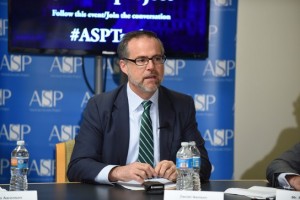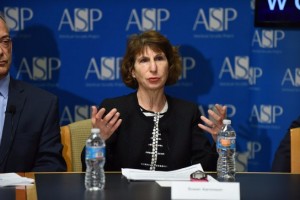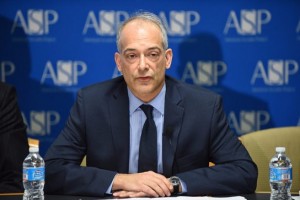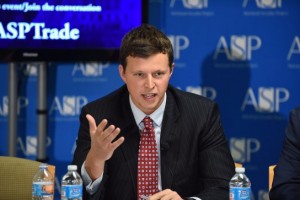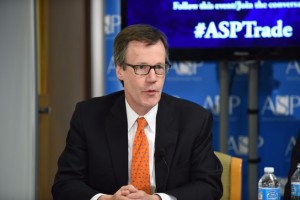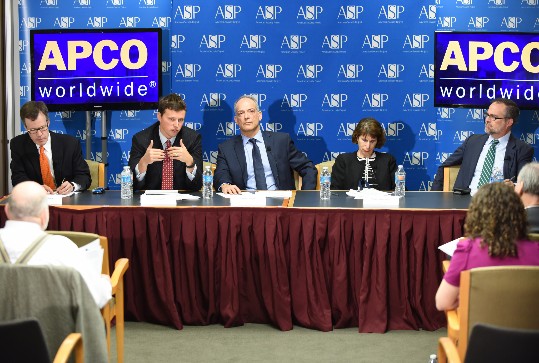
Strengthening Multilateral Trade Systems Through TTIP: ASP Conference
Podcast: Play in new window | Download
Subscribe: Apple Podcasts | RSS
The afternoon’s final panel, “TTIP, Emerging Markets and the Multilateral Trading System,” examined TTIP as a potential catalyst to liberalize trade, how to ensure the final agreement is truly inclusive and strengthens multilateral trade systems like the WTO, and the impact of TTIP and related negotiations on emerging markets like BRIC nations.
Daniel J. Ikenson, Director of the CATO Institute’s Herbert A. Stiefel Center for Trade Policy, opened with the suggestion that a final deal is, “truly several years off.” While there are shared perspectives on many components of the deal between the EU and US, Ikenson indicated that the shifting of key agenda items like GMOs, privacy and intellectual property, makes a comprehensive, long-term agreement unlikely in the immediate future. Suggesting that the TTIP negotiations are foremost an incentive for individual states to tackle their own governance reform issues, he said
“Most countries are not looking for a US-hegemonic system. I would like to see us go for the low hanging fruit every two years rather than a grand trade agreement.”
Research Professor of International Affairs at the Elliott School’s Institute of International Economic Policy Dr. Susan Aaronson addressed the audience next.
“TTIP could become the gold standard, making western [human, labor, and environmental rights] standards universal.”
Aaronson identified transparency as key to negotiations, except when discussing issues of national security or the intellectual property of firms.
“The internet has completely altered the informational flow. The trade negotiations of 20th century do not need to be the strategies of now.”
Aaronson closed by stating that for TTIP to be successful, “USTR needs to take a leading role in being accountable,” during negotiations. She also suggested more interaction with the general public, through crowdsourcing initiatives, as an opportunity to ensure a comprehensive and supported final deal.
Peter S. Rashish, Senior Advisor for Trade and Transatlantic Relations for Transnational Strategy Group, followed, stating
“As globalization increases, so does complexity as a result of diversity amoung economic systems. TTIP is a natural response to this diversity.”
Addressing TTIP’s impact on emerging markets, Rashish suggested the agreement catalyzed the renegotiation of existing trade and customs deals involving Brazil, Turkey, and other key markets.
“TTIP has had at least a neutral, if not a positive, impact on BRIC nations and emerging markets.”
Dr. Joshua Walker, Director Global Programs for conference-sponsor APCO Worldwide, supported the conclusions of his fellow panelists and hinted at the sequencing of TTP and TTIP before highlighting what he characterized as a “serious communications problem,” that stands to get in way of TTIP negotiations. Citing the criticism of TTIP in Turkey as an example, Walker argued the domestic political discussions surrounding the agreement have not been separated from the clear positive economic impact it stands to make. This trend is a major concern, argues Walker.
“While Turkey is not a member of the EU and cannot prevent TTIP from happening, it can be a real spoiler.”
Special Assistant to the President and Senior Director for International Economic Affairs for the National Security Council Christopher Smart carried Dr. Walker’s comments on TTP, TTIP and TPA, discussing the “coordinated strategic effort of the Administration” on TTIP. Smart stated that it is important to ensure TTIP is a true and inclusive catalyst for multilateral trade efforts.
“The president talks about improving on past trade agreements- this is very much at the heart of what he means, which is making sure the agreements are not only fair for American workers, but enforceable. A lot of these things that had been mentioned in previous agreements are now central and enforceable in the current agreements. Really, if you got these agreements alone- without the tariff and market access parts, they would be enormously important on their own.”
FURTHER READING:
TTIP: A U.S. and European Perspective-Event Summary
TTIP Benefits Go Well Beyond Economics
ASP’s Hugo Grondel on Why It Is Time to Answer TTIP’s Call for Action

